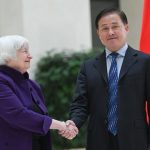Remember the advices from your mum and dad when you were a kid that you should study hard in order to get a good job? Assuming most of the readers are not above 50-years-old, you might laugh at the older advises to get a job with a bank because basically it was a job synonym with golden-bowl – meaning your job was secured for the rest of your life. At the current age however it was no longer adequate to get a job, let alone hope to secure one simply because job security has long joined the T-Rex as the extinct-species.
If you want to become rich but would not roam outside of “Employee” quadrant, then the only option is to sit on the very top of corporate hierarchy. The supply is scarce so you need to fight for it, play lots of politic, polish many pairs of shoes, pray for lucks and forget about self-dignity. It’s a dog-eat-dog world out there so to be at the right place at the right time and to rub the right shoulders are the key to success. Khazanah Nasional Bhd, the government investment arm, has confirmed the rumors by several blogs when it come out in defence of the proposed salary hike for top officials in government-linked companies (GLCs) today.
Referring to Tenaga Nasional Berhad (KLSE: TENAGA, stock-code 5347) the top officials were said to be given hefty salary increases (up to 100 percent?) in times of economic chaos due to recent 40.6% fuel hike and 18% – 26% electricity hike for homes and business users respectively. The subject of compensation or salary reviews is generally very subjective. For example most of the CEOs from oil and energy industry got their raises last year bigger than in other industries and judging by the current oil prices ($139.89 on June 16), this bunch of lucky fellows would again experience another round of windfalls this year.
According to a study by research firm Equilar the median total compensation of 12 CEOs at the largest U.S.-based, publicly traded oil companies, increased by more than four times the rate of that of executives in the Standard & Poor’s 500-stock index as a whole. For the U.S. companies in the study, total compensation includes base salary, bonus, stock options etc. Topping the list of non-U.S. executives was Chairman John C.S. Lau of Canada’s Husky Energy Inc. (TSE: HSE), who was awarded $26.25 million in 2007, up from just $4.25 million in 2006. However analysts say these CEOs are receiving pay raises based more on factors they don’t control such as skyrocketing oil prices than on managerial skills.
It’s true that these CEOs are reaping tens of millions of dollars each year easily mainly due to escalating oil prices – a classic example of being at the right place (or industry) at the right time with lots of lucks. So, using the same argument shall we conclude that the top officials from TENAGA should be accorded the same salary raises? First of all the oil CEOs cannot control the spiralling oil prices but TENAGA can choose not to cry like a baby asking for tariff hike in the first place. How hard could it be to sit on the TENAGA CEO’s chair when the task is to increase company’s profit by asking for candies from papa (government) all the time?
Secondly, judging by how the utility company squeezes your grapes to dry only to pass the juices back to IPP (independent power producers) goes to show TENAGA would have a very long journey before it can settle its’ long-term loan. And to think that Bakun Dam project would push more un-use electricity into TENAGA’s throat despite current utilization of only roughly 50 percent is simply perplexing. Do we really need an army of workers fixing a bulb on the street? I bet even by slapping the windfall tax on IPPs, these IPPs are still smiling all their ways to the bank. So, when Khazanah managing director Azman Mokhtar said the salary increses were performance-based, incentive-driven and self-funding but not taken (money) away from anybody; you can’t help but to think if this is the remaining intellectuals talking from their brains.
Other Articles That May Interest You …
- RM625 Rebate to be scrapped soon? Flip-Flop is Contagious
- Windfall Tax – why Discriminate and Petronas not in?
- Could the country pushed to the brink of Recession?

|
|
June 17th, 2008 by financetwitter
|


|

|

|

|

|

|




























Hi,
I like your analysis on this one. The windfall tax should be charged more on the IPP than the palm oil companies
Choong